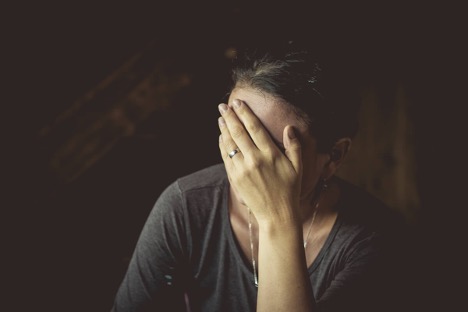Psychotic Depression. A Recurrent Syndrome


Written and verified by the psychologist Valeria Sabater
Major depression is a serious clinical disorder. However, psychotic depression, as well as being serious, is also debilitating and frightening. Furthermore, it happens more than you probably think. In fact, it’s especially common in geriatric patients. Symptoms include hallucinations, delusions, sadness, and feelings of guilt. On occasions, patients even self-harm. Without a doubt, this psychological condition warrants more public attention.
As we mentioned above, this illness requires an early diagnosis. This is because many of the patients that attempt suicide do so when they’re in the acute phase of the disorder. What often happens is that a patient might try to kill themselves when they’ve been suffering major depression for some time. However, they haven’t been diagnosed. Or they might attempt suicide because they’ve abandoned their treatment.
With an early diagnosis and intervention, the prognosis for this illness is good. However, it’s of the utmost importance for the patient to get treated early. The patient also needs a good social support system.
Bellow, learn how this type of depression manifests itself.

The symptoms of psychotic depression
There’s a wealth of scientific information available about schizophrenia, bipolar disorder, and non-psychotic depression. However, to date, psychotic depression hasn’t received much attention. Indeed, studies conducted at the University of Cambridge confirm this fact. Furthermore, they emphasize the need for a better understanding of the etiology of this particular disorder.
Older adults suffer more from this disorder. It’s also more prevalent when patients have a family history of psychosis or bipolar disorder. In addition, evidence shows that one in four people admitted to hospital for increased levels of depression shows symptoms of psychotic depression. In fact, it seems that this condition is actually more common than originally thought. Furthermore, the outcomes of the illness are pretty worrying.
The Diagnostic and Statistical Manual of Mental Disorders (DSM-5) describes this disorder as a major form of depression.
The symptoms of psychotic depression
Mood changes
The patient with psychotic depression feels sad, low, and depressed. However, they often also exhibit a sense of black humor. In addition, they experience outbursts of anger and rage for no apparent reason.
Low self-esteem and delirium
The patient constantly feels guilty and helpless. Furthermore, they have a distinct lack of self-love. These feelings might be exacerbated if the patient feels that they’re being neglected by their family and friends.
The delirium that the patient suffers makes them feel that they’re unloved by everyone. In addition, they feel totally worthless. This is often baffling for those people close to the patient.
Change in sleep patterns
The patient feels sleepy in the daytime and wide awake at night. Consequently, they experience ongoing changes in their sleep patterns.
Hallucinations that aren’t spoken about
They suffer hallucinations. However, they don’t often talk about them. The most common are auditory. For instance, they might hear a voice that tells them a particular family member doesn’t love them. In fact, they might even think that this family member is trying to poison them. They might also imagine that they’re suffering from specific diseases that’ll eventually kill them.
People who suffer from this type of depression are fully aware that it isn’t normal. That’s probably why they choose in so many cases to keep quiet about it. However, this, of course, makes any diagnosis difficult.
Disinterest in personal grooming
The patient with psychotic depression shows a complete disinterest in their personal grooming. They don’t bathe or change their clothes. They’re also likely to neglect household chores.
They stop communicating and interacting with their environment
In the most severe cases, the family sees how their relative suffering from this type of depression is gradually withdrawing from the world. They stop interacting. They don’t care about others and they show no interest in their friends. In fact, their daily life changes completely. Over time, they tend to move around less and less. Eventually, they become more or less confined to their bed or sofa, and they hardly ever get up.

How’s psychotic depression treated?
One of the reasons why psychotic depression isn’t too easily diagnosed is that the patient tends to hide their symptoms. They’re aware that the voices and delusional thoughts aren’t normal. Thus, they keep quiet about them. However, in certain cases, their suffering is so intense that they might resort to self-harm or even suicide.
For this reason, it’s absolutely crucial for the family to know what their relative is dealing with. In fact, in many cases, an early diagnosis means the patient won’t ever reach levels of severity that are too extreme. Because, as we mentioned earlier, the prognosis for this disorder is good when the illness is diagnosed early enough. Treatment is based on anti-depressants and antipsychotics. These regulate the patient’s moods. Furthermore, in most cases, cognitive behavioral therapy is very effective. Finally, it’s of extreme importance for professionals to monitor the patient on both a medical and psychological basis.
All cited sources were thoroughly reviewed by our team to ensure their quality, reliability, currency, and validity. The bibliography of this article was considered reliable and of academic or scientific accuracy.
- Jääskeläinen, E., Juola, T., Korpela, H., Lehtiniemi, H., Nietola, M., Korkeila, J. y Miettunen, J. (2018, 1 de abril). Epidemiología de la depresión psicótica – Revisión sistemática y metaanálisis. Medicina psicológica . Prensa de la Universidad de Cambridge. https://doi.org/10.1017/S0033291717002501
- Nietola, M., Huovinen, H., Heiskala, A., Nordström, T., Miettunen, J., Korkeila, J., & Jääskeläinen, E. (2020). Early childhood and adolescent risk factors for psychotic depression in a general population birth cohort sample. Social Psychiatry and Psychiatric Epidemiology, 55(9), 1179–1186. https://doi.org/10.1007/s00127-020-01835-7
This text is provided for informational purposes only and does not replace consultation with a professional. If in doubt, consult your specialist.








